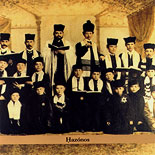Blown away by "A Cantor's Tale"
I have too much work to be spending time writing about things on the KlezmerShack right now, but I can't not mention the most amazing, music-affirming movie I have seen since the Epstein Brothers movie, or Michal Goldman's groundbreaking "A night in the garden of eden."
I am talking about "A Cantor's Tale," of course, a movie that manages to be part biography of the amazing cantor, Jack Mendelson, part history lesson, and more than anything, a movie that undoes years of bad Hebrew School experiences and excruciating Saturday mornings spent listening to the Jewish prima donna onthe synagogue bima, waiting for the moment to mumble appropriately in response to some endless tortured solo—the guys (it was always guys back then) who turned the repetition of the amidah into a reprise of the descent into the underworld..
Mendelson loves cantorial music. Okay. But what makes this movie so amazing is that by the end of the movie, everyone loves cantorial music. You want to come home and do as we did—Judy put on some Kousivetsky (sp?) upstairs, and I immediately plugged in Frank London's most recent CD (not coincidentally featuring this same amazing Jack Mendelson) and bask in the joy and affirmation that comes from it.
Mendelson gets everyone singing cantorial music. In Israel, he gets the obviously un-Ashkenazi guard near the Kotel (Western Wall) to start singing with him. Mendelson walks into eateries in Boro Park, Brooklyn, and gets people to sing cantorial music. In Mendelson's world, everyone knows some nusach. Watching the music, you not only come to love the music (do you think it a coincidence that this is London's second cantorial record? That David Chevan is also involved? That klezmer/yiddish plucked string instrument master Jeff Warschauer is in cantorial school?), but you also get a sense of cantorial music as sort of the "slow food" version of speaking with God, a way of channeling kavanah, intent, a way of davenning not as audience, but in participation with someone able to put focus religious intent and to bring about a belief that God listens and it matters to he/she/it (assuming that God exists, which is a subject for a different weblog) that such a dialogue happen.
 Did I mention that all of this happens without watching people praying? It's something that sinks in as Mendelson sings and interacts with other cantors, we hear snippets of interviews with friends, historians, other cantors, we come to know Mendelson, but more than anything, we get a sense of the mame Jewish music, Ashkenazic in this case (but anyone who has listened to cantor ben Sasson of Toronto knows that the tradition is broader and goes back farther than mere Ashkenaz) whence came klezmer and other Jewish music. This is the wellspring of what it means to sing and make Jewish music.
Did I mention that all of this happens without watching people praying? It's something that sinks in as Mendelson sings and interacts with other cantors, we hear snippets of interviews with friends, historians, other cantors, we come to know Mendelson, but more than anything, we get a sense of the mame Jewish music, Ashkenazic in this case (but anyone who has listened to cantor ben Sasson of Toronto knows that the tradition is broader and goes back farther than mere Ashkenaz) whence came klezmer and other Jewish music. This is the wellspring of what it means to sing and make Jewish music.
I'm being pretentious. Do yourself a favor. Find a festival where this movie is appearing and make sure you see it. When it comes out in DVD in a year or so, get a copy so you can get a refresher viewing when you need a "pick me up".
In the meantime, don't forget to pick up a copy of Frank's new album, "Hazonos," on Tzadik. A review will follow shortly, somehow. (London composed the score for the movie, of course.)
Comments
Perhaps it is a coincidence, but well-known klezmer Joe Kurland is also a part-time cantor in Massachusetts.
Posted by: Saul Davis | November 8, 2005 11:41 PM
Joe has been ahead of the curve for many years and is a fine cantor. Not a coincidence at all, imho!
Posted by: Ari Davidow | November 9, 2005 7:11 AM
You can add me to the list of klezmer musicians starting cantorial school (although I'm not quite as well-known as Jeff Warschauer...)
Posted by: Yakov Chodosh | March 24, 2006 3:39 AM
I would guess that folks on the Jewish-Music list remember you well! Keep us posted on your new course of study and best of luck.
ari
Posted by: Ari Davidow | March 24, 2006 10:01 AM